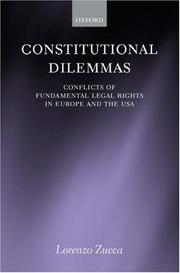| Listing 1 - 10 of 22 | << page >> |
Sort by
|
Book
ISBN: 9780810141483 9780810141490 0810141485 0810141493 Year: 2020 Publisher: Evanston (Ill.): Northwestern university press,
Abstract | Keywords | Export | Availability | Bookmark
 Loading...
Loading...Choose an application
- Reference Manager
- EndNote
- RefWorks (Direct export to RefWorks)
Husserl and the Idea of Europe argues that Edmund Husserl’s late reflections on Europe should not be read either as departures from his early transcendental phenomenology or as simple exercises of cultural criticism but rather as systematic phenomenological reflections on generativity and historicity. Timo Miettinen shows that Husserl’s reflections on Europe contain his most compelling and radical interpretation on the intersubjective, communal, and historical dimensions of phenomenology. Husserl and his generation worked in the aftermath of World War I, as Europe struggled to redefine itself, and he penned his late writings as the clouds of World War II gathered. Decades later, the fall of the Soviet Union again altered the continent’s identity and its political and economic divisions. Miettinen writes as a European involved in the question of Europe, and many of the recent authors and critics he addresses in this work—such as Michel Foucault, Jacques Derrida, and Giorgio Agamben—likewise deeply engaged with this new problem of European identity. Husserl and the Idea of Europe interprets key concepts of Husserl’s late philosophy in new, compelling ways. The book illuminates the multifaceted problem of the idea of European rationality, and it defends novel conceptions of universalism and teleology as necessary components of radical philosophical reflection.
Phenomenology --- Political science --- Philosophy --- Husserl, Edmund, --- Europe --- Political science - Europe - Philosophy --- Husserl, Edmund, - 1859-1938 --- Europe - Philosophy
Book
ISBN: 2852760460 9782852760462 Year: 1990 Volume: 6 Publisher: Bordeaux: Bière,
Abstract | Keywords | Export | Availability | Bookmark
 Loading...
Loading...Choose an application
- Reference Manager
- EndNote
- RefWorks (Direct export to RefWorks)
Law --- Justice (Philosophy) --- Philosophy. --- -Justice (Philosophy) --- -Acts, Legislative --- Enactments, Legislative --- Laws (Statutes) --- Legislative acts --- Legislative enactments --- Jurisprudence --- Legislation --- Philosophy --- Philsosphy --- -Philosophy --- -Philsosphy --- Law - Philosophy --- Law - Europe - Philosophy.

ISSN: 02989972 ISBN: 2204066494 9782204066495 Year: 2001 Publisher: Paris: Cerf,
Abstract | Keywords | Export | Availability | Bookmark
 Loading...
Loading...Choose an application
- Reference Manager
- EndNote
- RefWorks (Direct export to RefWorks)
Civil society --- Law --- Philosophy. --- Philosophy --- -Law (Philosophy) --- Law (Philosophy) --- Social contract --- Europe --- -Council of Europe countries --- Eastern Hemisphere --- Eurasia --- Civilization --- -Civilization --- Civilization. --- Civil society - Europe - Philosophy. --- Law - Philosophy
Book
ISBN: 342810885X 9783428108855 Year: 2003 Volume: 101 Publisher: Berlin: Duncker und Humblot,
Abstract | Keywords | Export | Availability | Bookmark
 Loading...
Loading...Choose an application
- Reference Manager
- EndNote
- RefWorks (Direct export to RefWorks)
Law --- Philosophy --- History. --- Acts, Legislative --- Enactments, Legislative --- Laws (Statutes) --- Legislative acts --- Legislative enactments --- Philosophy&delete& --- History --- Jurisprudence --- Legislation --- Law - Europe - Philosophy - History.
Book
ISBN: 3631429398 9783631429396 Year: 1990 Volume: 12 Publisher: Frankfurt a. M.: Lang,
Abstract | Keywords | Export | Availability | Bookmark
 Loading...
Loading...Choose an application
- Reference Manager
- EndNote
- RefWorks (Direct export to RefWorks)
Law --- Social sciences --- Social history --- Philosophy, Medieval. --- Law, Medieval. --- Philosophy --- History. --- -Social sciences --- -Law, Medieval --- Philosophy, Medieval --- -Descriptive sociology --- Social conditions --- History --- Sociology --- Medieval philosophy --- Scholasticism --- Medieval law --- Behavioral sciences --- Human sciences --- Sciences, Social --- Social science --- Social studies --- Civilization --- Acts, Legislative --- Enactments, Legislative --- Laws (Statutes) --- Legislative acts --- Legislative enactments --- Jurisprudence --- Legislation --- -History --- -Philosophy --- Law, Medieval --- Philosophy&delete& --- Law - Europe - Philosophy - History. --- Social sciences - Europe - Philosophy - History. --- Social history - Medieval, 500-1500.

ISBN: 9780199204977 0199204977 9780199552184 0199552185 Year: 2007 Publisher: Oxford: Oxford university press,
Abstract | Keywords | Export | Availability | Bookmark
 Loading...
Loading...Choose an application
- Reference Manager
- EndNote
- RefWorks (Direct export to RefWorks)
Public law. Constitutional law --- Human rights --- America --- Europe --- Civil rights --- Constitutional law --- Privacy, Right of --- Droits de l'homme --- Droit constitutionnel --- Droit à la vie privée --- Philosophy. --- Philosophie --- Droit à la vie privée --- Civil rights - Europe - Philosophy. --- Civil rights - United States - Philosophy. --- Philosophy

ISBN: 0691034931 9780691034935 0691167982 140084360X 9781400843602 9780691167985 Year: 1995 Publisher: Princeton, NJ : Princeton University Press,
Abstract | Keywords | Export | Availability | Bookmark
 Loading...
Loading...Choose an application
- Reference Manager
- EndNote
- RefWorks (Direct export to RefWorks)
The Neanderthals populated western Europe from nearly 250,000 to 30,000 years ago when they disappeared from the archaeological record. In turn, populations of anatomically modern humans, Homo sapiens, came to dominate the area. Seeking to understand the nature of this replacement, which has become a hotly debated issue, Paul Mellars brings together an unprecedented amount of information on the behavior of Neanderthals. His comprehensive overview ranges from the evidence of tool manufacture and related patterns of lithic technology, through the issues of subsistence and settlement patterns, to the more controversial evidence for social organization, cognition, and intelligence. Mellars argues that previous attempts to characterize Neanderthal behavior as either "modern" or "ape-like" are both overstatements. We can better comprehend the replacement of Neanderthals, he maintains, by concentrating on the social and demographic structure of Neanderthal populations and on their specific adaptations to the harsh ecological conditions of the last glaciation. Mellars's approach to these issues is grounded firmly in his archaeological evidence. He illustrates the implications of these findings by drawing from the methods of comparative socioecology, primate studies, and Pleistocene paleoecology. The book provides a detailed review of the climatic and environmental background to Neanderthal occupation in Europe, and of the currently topical issues of the behavioral and biological transition from Neanderthal to fully "modern" populations.
Behavior evolution --- Human evolution --- Neanderthals --- Paleolithic period --- Philosophy. --- Europe --- Antiquities. --- Homo mousteriensis --- Homo neanderthalensis --- Homo primogenicus --- Homo sapiens neanderthalensis --- Neandertalers --- Neandertals --- Neanderthal race --- Neanderthalers --- Behavioral evolution --- Fossil hominids --- Evolutionary psychology --- Evolution (Biology) --- Physical anthropology --- Human beings --- Origin --- Philosophy --- Antiquities --- Neanderthals - Europe. --- Human evolution - Europe - Philosophy. --- Behavior evolution - Europe.
Book
ISBN: 0729408221 9780729408226 Year: 2003 Volume: 2003:09 Publisher: Oxford: Voltaire foundation,
Abstract | Keywords | Export | Availability | Bookmark
 Loading...
Loading...Choose an application
- Reference Manager
- EndNote
- RefWorks (Direct export to RefWorks)
Enlightenment --- Siècle des lumières --- Politics and government --- Politique et gouvernement --- Political science --- Philosophy --- History --- -Administration --- Civil government --- Commonwealth, The --- Government --- Political theory --- Political thought --- Politics --- Science, Political --- Social sciences --- State, The --- Aufklärung --- Eighteenth century --- Philosophy, Modern --- Rationalism --- -History --- -Enlightenment --- -Philosophy --- Siècle des lumières --- -Aufklärung --- Administration --- Europe --- 18th century --- Congresses --- Political science - Europe - Philosophy - History - 18th century
Book
ISBN: 3039101013 9783039101016 Year: 2004 Volume: *6 Publisher: Berne: Lang,
Abstract | Keywords | Export | Availability | Bookmark
 Loading...
Loading...Choose an application
- Reference Manager
- EndNote
- RefWorks (Direct export to RefWorks)
Filantropijnen --- Philanthropinism --- Philanthropinisme --- Education --- History --- Philosophy --- #PBIB:2005.3 --- Switzerland --- 18th century --- Basedow, Johann Bernhard --- Influence --- Wolke, Christian Heinrich --- Children --- Education, Primitive --- Education of children --- Human resource development --- Instruction --- Pedagogy --- Schooling --- Students --- Youth --- Civilization --- Learning and scholarship --- Mental discipline --- Schools --- Teaching --- Training --- Education - Europe - History - 18th century --- Education - Europe - Philosophy - History - 18th century --- BASEDOW (JOHANN BERNHARD), 1724-1790 --- EDUCATION --- PEDAGOGIE --- 18E SIECLE --- ALLEMAGNE
Book
ISBN: 9783772824302 3772824307 Year: 2008 Volume: 18 Publisher: Stuttgart: Frommann-Holzboog,
Abstract | Keywords | Export | Availability | Bookmark
 Loading...
Loading...Choose an application
- Reference Manager
- EndNote
- RefWorks (Direct export to RefWorks)
Education, Higher --- Philosophy --- Schelling, Friedrich Wilhelm Joseph von, --- Conferences - Meetings --- College students --- Higher education --- Postsecondary education --- Universities and colleges --- Education --- Education, Higher - Europe - Philosophy - Congresses --- Education, Higher - Europe - Congresses --- Schelling, Friedrich Wilhelm Joseph von, - 1775-1854 - Vorlesungen über die Methode des academischen Studium - Congresses --- Schelling, Friedrich Wilhelm Joseph von, - 1775-1854 - Vorlesungen über die Methode des academischen Studium
| Listing 1 - 10 of 22 | << page >> |
Sort by
|

 Search
Search Feedback
Feedback About UniCat
About UniCat  Help
Help News
News